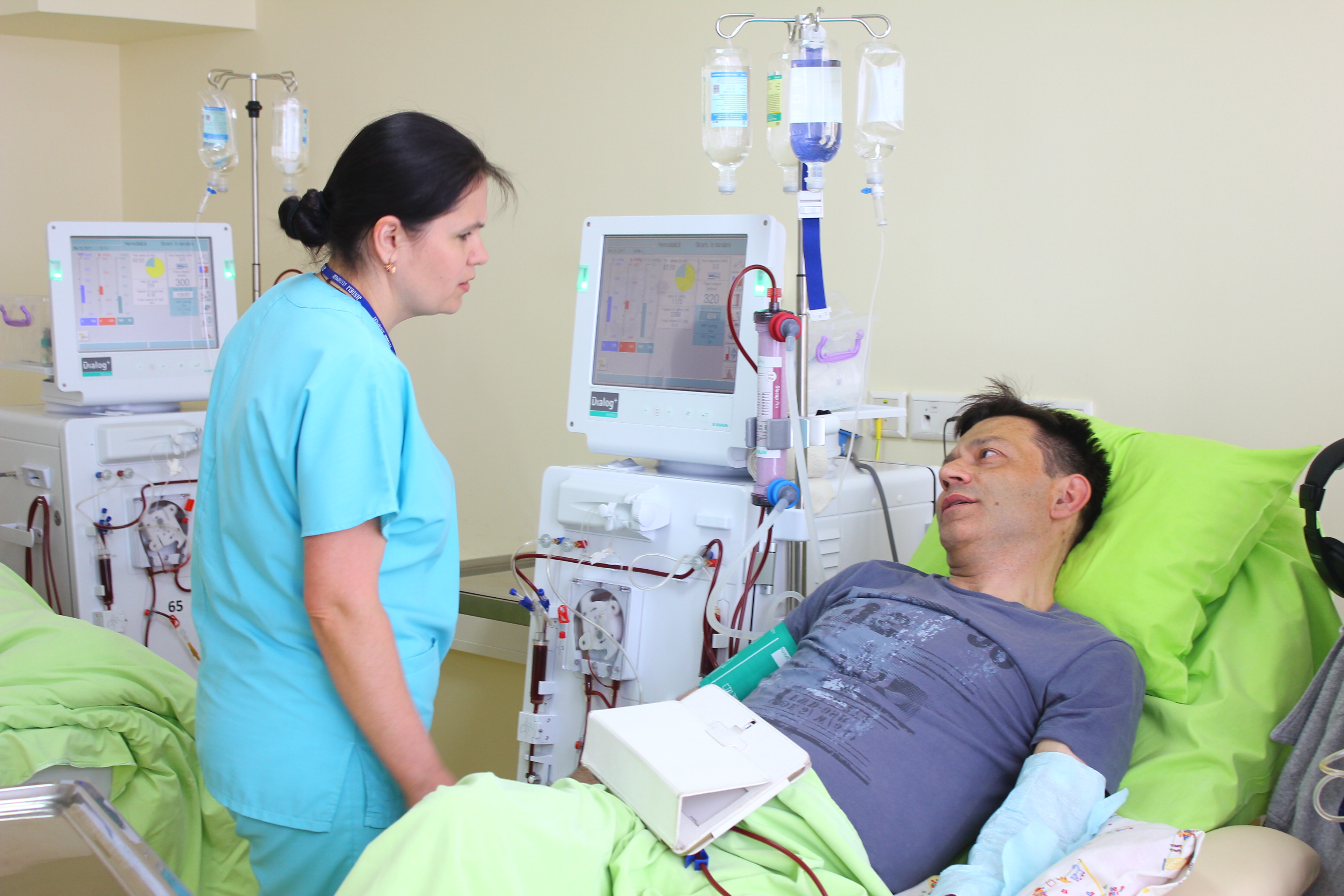It is rather complicated for patients to accept that they have to go to the dialysis center several times a week , to revise their lifestyle and report it during hemodialysis hours.
Millions of people around the world manage to adapt and live qualitatively, being dependent on dialysis.
You will surely succeed!
At the dialysis center, you will be connected to a device that performs part of the functions that are normally performed by the kidneys.
During hemodialysis, the blood is pumped from the body, filtered through the dialyzer and returned to the body. In the dialyzer the blood passes through hundreds of thin tubes made of special membranes with thousands of small holes. Through these holes, toxins and certain chemicals pass, thus being removed from the blood. Then, these chemicals and toxins are removed by the dialysis machine.
The filtered and cleansed blood is then reintroduced into the body through other tubes connected to the blood vessels of the patient.
Do not be afraid! Only a part of the blood is taken during the dialysis session. The human body, with about 4.5 liters of blood, tolerates the small amount of blood, about 200 ml, which is evacuated and immediately returned to the body during the medical procedure. Every 15 minutes, all circulating blood volume is passed through the dialysis machine.
If necessary, during dialysis, the patient is given additional medication. Patient complaints, blood pressure, pulse are monitored. After dialysis, the place of puncture is fixed with a compressive dressing. The patient is weighed before and after dialysis. It is recommended to rest a few minutes after dialysis.
Dialysis is not a painful medical procedure! During the hemodialysis session the patient can sleep if he wants to.
YES!
- I accept hemodialysis treatment.
The decision to include the patient in dialysis is taken by a specialist who, on the basis of a number of investigations and laboratory test results, will tell the patient what is the best time to start hemodialysis procedures.
- The doctor knows better what kind of treatment I need!
In the era of information and Internet it is natural to get informed and read about your disease. Hence, if you think you know better what treatment is right for you, be ready to assume the consequences. The attending physician, together with nurses, are responsible for the dialysis procedure and, under the license, this right is legally grounded. The patient’s refusal to comply with the medical staff’s request imposes responsibility on the patient.
- The doctor is the one who chooses the appropriate method for kidney function substitution.
Fiecare din metodele de substituţie a funcţiei renale are avantaje şi dezavantaje: medicale, tehnice şi economice. Selectarea metodei de substituţie a funcţiei renale este efectuată de către medicul curant în baza particularităţilor individuale ale pacientului, ținând cont de capacitatea Centrului de dializă.
Each of renal function substitution methods has advantages and disadvantages: medical, technical and economic. Selecting the renal function substitution method is performed by the physician basing on individual characteristics of the patient, taking into account the capacity of the Dialysis centers.
NO!
- I DO NOT ask for additional medication during dialysis!
The indication for additional medication during dialysis is performed to combat complications of renal failure and associated diseases. The administration of drugs during dialysis is dictated by the standards in force, carried out and regularly updated by specialists in the field and approved by the Ministry of Health of the Republic of Moldova.
- I DO NOT insist on the use of certain dialysis filters
The dialysis filters have different blood-cleaning properties for the patient. Among the most important features of dialysis filters are: the surface, the diameter of the semi-permeable membrane pores and the filter material. Choosing the wrong filter may cause insufficient or excessive elimination of toxins, imbalance syndrome, allergic reactions, etc. To prevent such complications, the attending physician selects the most effective dialysis filter individually for each patient, within the available stock limit.
- It is NOT allowed to change the dialysis session parameters on the request of the patient
The selection of parameters is performed by the dialysis room nurse, based on the instructions of the attending physician. It is not permitted to intervene in changing the parameters of the dialysis session.
Modern dialysis devices allow modification of many parameters. Dialysis can be performed on the basis of special programs or individualized.



